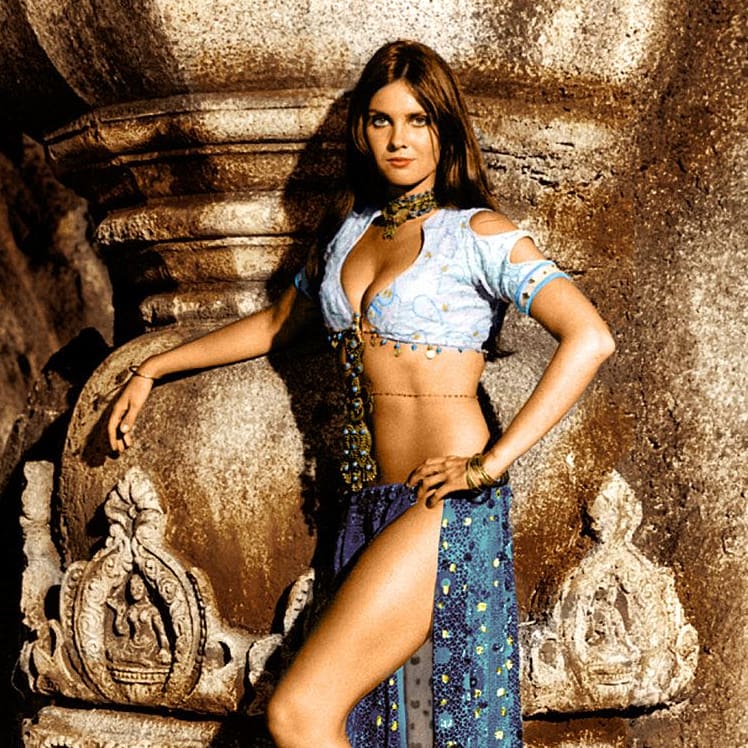

- Rock
- Moderator
 Offline
Offline 
Re: 1974: Lil Jinn's Year of Prescient Cinema
Kristel goes a long way, but I think I actually prefer the second Emmanuelle. I think the male leads in that one are a huge upgrade from the original, and I like the darker, more decadent look it has over the soft, gauzy look of the original. And in purely superficial terms, I think she has nicer hair in the second movie.
I also really liked Jaeckin's take on The Story of O, whose recent arrival on the Criterion Channel luckily means we're past the era of performative social justice minded cinephiles twisting themselves into knots over male gaze being inherently problematic or the other bullshit these types like to spout.
As far as hardcore goes, the obvious highlight from the ones I've seen is Memories Within Miss Aggie, an icy psychological horror which is one of the clearer examples of Gerard Damiano's Bergman influence. Not very sexy, but very good.
I am not above abusing mod powers for my own amusement.
- Rock
- Moderator
 Offline
Offline 
Re: 1974: Lil Jinn's Year of Prescient Cinema
Rock wrote:
we're past the era of performative social justice minded cinephiles twisting themselves into knots over male gaze being inherently problematic or the other bullshit these types like to spout.
And maybe I'm being uncharitable, but I'm like 90% sure the new Emmanuelle is going to be made through this lens and end up being a waste of time.
I am not above abusing mod powers for my own amusement.
- Jinnistan
- Administrator
 Offline
Offline 
Re: 1974: Lil Jinn's Year of Prescient Cinema
Rock wrote:
Kristel goes a long way, but I think I actually prefer the second Emmanuelle. I think the male leads in that one are a huge upgrade from the original, and I like the darker, more decadent look it has over the soft, gauzy look of the original. And in purely superficial terms, I think she has nicer hair in the second movie.
Fair enough, and actually I haven't seen any of the other Emmanuelle films so I probably shouldn't have declared its supremacy so definitively.
Rock wrote:
I also really liked Jaeckin's take on The Story of O, whose recent arrival on the Criterion Channel luckily means we're past the era of performative social justice minded cinephiles twisting themselves into knots over male gaze being inherently problematic or the other bullshit these types like to spout.
The problem is the seeming inability to differentiate gaze which is toxic from which is erotic. And because this distinction doesn't have easily defined parameters, being based on sensual perception, people seem to default to calling everything overly erotic as being toxic. Or like defining all nudity as equally objectifying. It's another example of "all or nothing" moralizing, where any nuance or context is accused of being a cop-out.
- •
- Rock
- Moderator
 Offline
Offline 
Re: 1974: Lil Jinn's Year of Prescient Cinema
Jinnistan wrote:
Rock wrote:
Kristel goes a long way, but I think I actually prefer the second Emmanuelle. I think the male leads in that one are a huge upgrade from the original, and I like the darker, more decadent look it has over the soft, gauzy look of the original. And in purely superficial terms, I think she has nicer hair in the second movie.
Fair enough, and actually I haven't seen any of the other Emmanuelle films so I probably shouldn't have declared its supremacy so definitively.
I'd say the original trilogy is all worth watching. There's definitely a drop off in quality with the third, but it has some nice cinematography and a bizarrely reggae-influenced soundtrack by Serge Gainsbourg.
The Laura Gemser ones are definitely more in the vein of exploitation. I think Emanuelle in America is generally considered the best one. It has somebody jacking off a horse, a bunch of hardcore inserts, and a really grimy faux snuff film sequence. Worth a look if you can stomach it.
I am not above abusing mod powers for my own amusement.
- Jinnistan
- Administrator
 Offline
Offline 
Re: 1974: Lil Jinn's Year of Prescient Cinema
Rock wrote:
It has somebody jacking off a horse, a bunch of hardcore inserts, and a really grimy faux snuff film sequence. Worth a look if you can stomach it.
*generally considered the best*
- •
- Rock
- Moderator
 Offline
Offline 
Re: 1974: Lil Jinn's Year of Prescient Cinema
You laugh but Letterboxd is full of 4 and 5 star ratings.
It’s not boring at the very least.
I am not above abusing mod powers for my own amusement.
- Jinnistan
- Administrator
 Offline
Offline 
Re: 1974: Lil Jinn's Year of Prescient Cinema
Let's class it up a little bit...
Peter Bogdanovich is inarguably one of the leading figures of New Hollywood, but this film has the reputation of beginning his descent into indulgence. Bogdanovich's wistful nostalgic style had done him well up to this point, producing homages to rural, small town Americana (Last Picture Show) and more uptown screwball comedy (What's Up Doc?) and, maybe his best, something vaguely in-between (Paper Moon). What elevates these films is a sense of sentimental grace which helps to translate the tinsel nostalgia for modern, younger and hipper, audiences.
But his adaptation of Henry James' Daisy Miller has been largely seen as a vanity project for his then-girlfriend Cybill Shepherd, which is especially unfair to the actress. The three films that Bogdanovich made in the mid-70s, including At Long Last Love and Nickelodeon, do indeed seem increasingly indulgent, to be sure, and all of these films would prove to be flops, smaller scale than Cimino's Heaven's Gate perhaps but omens of New Hollywood overreach. So the question remains whether Daisy Miller deserves a reassessment, outside of the context of its successors, and outside of some of the less generous presumptions of Shepherd's talents and Bogdanovich's motives. As has been well told in various documentaries, Bogdanovich had become a somewhat vain talk show raconteur at this time and served himself up as a convenient scapegoat of such pompous Hollywood hubris, none of which should affect the perception of this film even though at the time it was inextricable from its reception. Personally, I think it's a fine film, on par with some of his European contemporaries but out-of-step in America.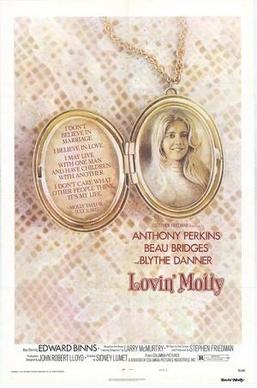
The influence of Americana nostalgia represented by Bogdanovich's Last Picture Show breakthrough continued to be an alluring narrative line through the '70s, and some directors were more suited for it than others. New Yorker Sidney Lumet was not particularly, but he was always industrious enough to try during this period when, like his peer Robert Altman, he was capable of producing multiple films a year. Indeed, Lumet would make among the finest films of the decade but noticeably his best work was more suited to modern and urban culture. Writer Larry McMurty has admitted that Lumet never really understood Texas, visually or sensually. This film has some decent performances, especially Blythe Danner.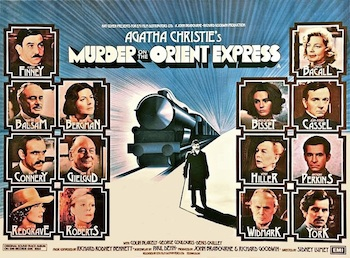
This is not Lumet's best of the decade (that's a tight fight between Dog Day Afternoon and Network), but it was probably his most successful, and allows Lumet to play to his strengths of crafting an exciting potboiler while orchestrating a fine cast of all-star performances. This film might be the acme of the entire Agatha Christie-inspired mystery theater formula.
- •
- Jinnistan
- Administrator
 Offline
Offline 
Re: 1974: Lil Jinn's Year of Prescient Cinema
Let's get into the exploitation
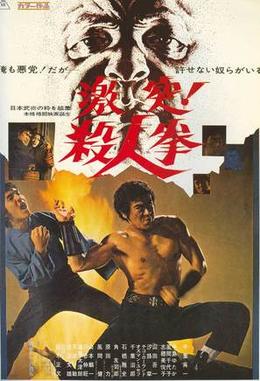
Bruce Lee was a motherfucker, and there weren't a whole lot of motherfuckers waiting in the wings. But after Lee's death, boy, did they find folks. But this isn't "Bruceploitation" yet. This is a higher quality shelf of runners-up.
First up is Jim Kelly, bridging blaxploitation with kung-fu-sploitation in a very entertaining picture that brings the best aspects of both, wrapped up in the ribbon of one of the better soundtracks by Motown guitar-wiz Dennis Coffey. Proverbially? This is the shit.
Sonny Chiba is Japan's immediate answer to Bruce Lee, and Street Fighter is his premiere showcase. There are many sequels, but if you have any decent concern for integrity, you're going to start here.
- •
- Jinnistan
- Administrator
 Offline
Offline 
Re: 1974: Lil Jinn's Year of Prescient Cinema

One of the more obvious essential blaxploitation films, and likely one of Pam Grier's highlights. Badass, and Willie Hutch on soundtrack.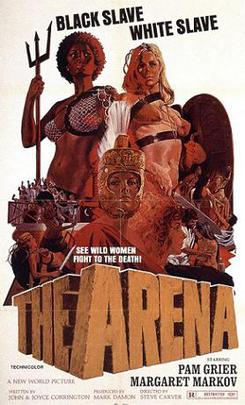
One of those blaxploitation films with international money, produced by Mark Damon the sleazy ex-pat. Lots of fun for fans of scantily clad buff women, including Rosalba Neri, covers all the bases if these are the bases you care to cover. (And I do.)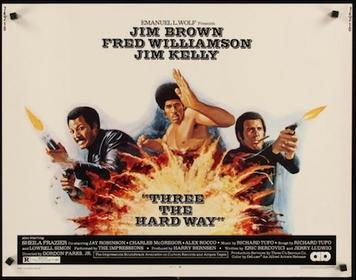
Classic match up among the best black machismo, directed by Gordon Parks Jr (Superfly).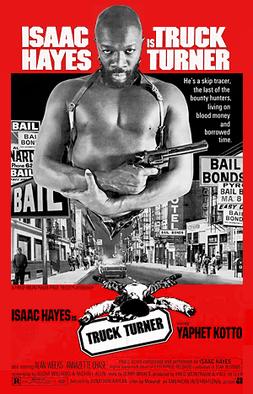
Isaac Hayes enters the blaxploitation sweepstakes, providing his own soundtrack, kicking all the ass, and Yaphet Kotto is requested to watch his.
You have to excuse me. I thought that this was a Rudy Ray Moore film, but it isn't. It's just bad.
- •
- Jinnistan
- Administrator
 Offline
Offline 
Re: 1974: Lil Jinn's Year of Prescient Cinema
I should have mentioned Oscar Williams in the previous post, as one of the few true independent Black filmmakers in the blaxploitation genre. His two earlier films, The Final Comedown and Five on the Black Hand Side (which is actually a blaxploitation parody) are some of the great underseen films of the genre, where the exploitation never overcomes the authentic Black voice. Unsurprisingly, Williams was the screenwriter for two of the very best blaxploitation films of 1974, Black Belt Jones and Truck Turner.
1974 also saw a crop of blaxploitation horror films, which refreshingly weren't just rehashes of Universal archetypes.
Voodoo zombies would be the logical setting for the genre, but as with most AIP productions, there's an overarching cheapness to the proceedings.
This may not even fall into the blaxploitation mold, despite also having a voodoo setting with an overwhelmingly Black cast, and also being remarkably low-budget. The film isn't bad though, currently available in the Youtube Theater thread!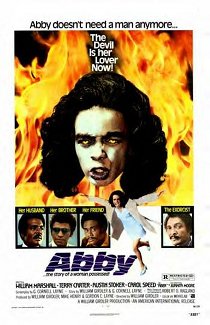
Pretty much the Black Exorcist, not a lot of surprises, not the worst Exorcist rip-off of the year, and actually quite funny for all the wrong reasons. Would've been a riot with a vintage Black audience.
A couple of films which are also peripheral to the genres and kind of orphaned as a result.
A British production, but the central casting of Calvin Lockhart and Marlene Clark invites blaxploitation comparisons. Some have even said that this was the real Black Werewolf film to compliment Blacula and Blackenstein. Despite the original corny "whudunnit?" gimmick built into the final reel, the film is an enjoyable '10 Little Indian' mystery ensemble around the werewolf conceit. 
Another exploitation film which sits somewhere in a nebulous limbo between established genres. This includes a lot of the Asian exotica (directed by Robert Clouse, from Enter The Dragon) and co-starring Jim Kelly fresh off of Black Belt Jones (also directed by Clouse), this isn't really a kung fu or action film, but it is AIP and kind of cheap and they managed to rope Burgess Meredith into the mix. But it's not that bad a movie.
- •
- Jinnistan
- Administrator
 Offline
Offline 
Re: 1974: Lil Jinn's Year of Prescient Cinema
And some of the great Black films of the year which do not fall into the blaxploitation category.
Although the white directer, Michael Campus, was coming off of the blaxploitation film The Mack, this film, a true-life adaptation of Sonny Carson's autobiography, is a brutally sober drama that exploits nothing but cold skillet reality.
Another film with blaxploitation lineage, this film from Gordon Parks Jr. (Superfly, Three the Hard Way) from an original script by lead actor Max Julien (The Mack) is not blaxploitation at all, but a black variation on the Bonnie & Clyde formula set in the early 1900s West. Cinematography by Lucien Ballard (Wild Bunch).
This film has a lot of the spark and sass of blaxploitation but it is a full-fledged Warner Bros. production, with Sidney Poitier directing a cast of premium black talent of 1974 - Bill Cosby, Richard Pryor, Harry Belefonte, Flip Wilson, Roscoe Lee Browne, Calvin Lockhart. It is the mainstream greatest black comedy of the '70s.
The term "respectibility" has been given a distasteful connotation recently, so a film like this which was intended to inspire rather than exploit tends to get pushed aside regardless of the efforts of elders James Earl Jones and Diahann Carroll. Hopefully these kinds of films which favor a neo-realism as a counter to stylish flash will find a renaissance. Excellent soundtrack by Curtis Mayfield as well.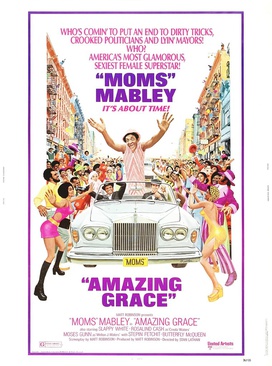
Another film that is a testament to the legacy of black comedic talent. This is Moms Mabley's last film, and really the only film dedicated to her comic talent, directed by Stan Lathan who would continue TV work with Dave Chappelle and Martin Lawrence in the 90s, and written by the original Gordon from Sesame Street. It is indeed about time.
- •
- Rock
- Moderator
 Offline
Offline 
Re: 1974: Lil Jinn's Year of Prescient Cinema
Some good stuff in the last few batches.
Tbh I'd pick Death on the Nile as my favourite Poirot, but that might be because we had it on VHS when I was growing up.
Black Belt Jones is fun, but I suspect the Golden Harvest crew played a big part in why Enter the Dragon is great, because none of Robert Clouse's other films have been nearly as good from what I've seen.
And The Street Fighter is a blast, but definitely more exploitative than the Lee joint. The "hero" does some pretty fucked up stuff early on, IIRC.
Can't argue with Foxy Brown (which I'm well overdue for a rewatch of), Three the Hard Way and Truck Turner. I've seen Sugar Hill but don't remember anything about it.
Criterion played Thomasine & Bushrod and Uptown Saturday Night on their streaming service, and released Claudine on Blu-ray, IIRC.
I am not above abusing mod powers for my own amusement.
- Jinnistan
- Administrator
 Offline
Offline 
Re: 1974: Lil Jinn's Year of Prescient Cinema
Rock wrote:
Criterion played Thomasine & Bushrod and Uptown Saturday Night on their streaming service, and released Claudine on Blu-ray, IIRC.
A little surprising that would be the choice for a physical release, but good to hear. I'd love to see a Criterion Ganja & Hess tbh.
- •
- Jinnistan
- Administrator
 Offline
Offline 
Re: 1974: Lil Jinn's Year of Prescient Cinema
Not a good year for Hammer.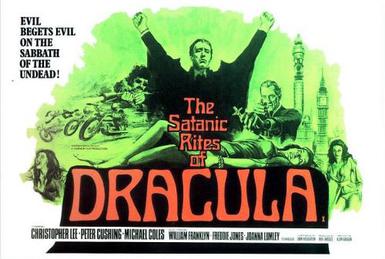


These films have tended to subside near the bottom of fans' list of Hammer output. There are some noteable attempts at reappreciation, the 7 Golden Vampires being the singular Hammer/Shaw Bros. collaboration, again meshing the undercurrents of horror and kung-fu genres of the time. Some have even tried to elevate some sympathy for poor Monster From Hell into the underappreciated abused loser status. The stale air was apparent enough to effectively end these Cushing/Lee match-ups for nearly a decade, and for some reason even the popular omnibus films had seemed to run out of steam this year. But there was, of course, one exemplary outlier, according to some....
Is this, as some say, "the last great Hammer horror film"? Or is this one last ride through the wardrobe department before the taxes come due? It doesn't really matter. It's fun stuff, exactly the kind of cartoon matinee horror fix that gets taken for granted. Don't snob on this.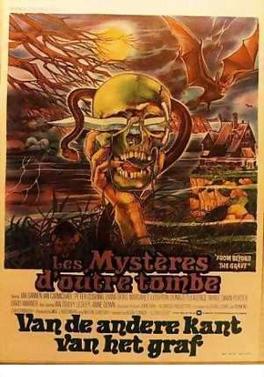
The only notable anthology horror of the year was from Amicus, From Beyond the Grave, the last in their run of mid-grade horror omnibuses (House That Dripped Blood, Tales From the Crypt, Asylum, Vault of Terror) which revolves around stories involving Peter Cushing's curiosity shop of cursed objects.
Also in the Amicus/AIP stable, Peter Cushing and Vincent Price revive another mediocre exercise in campy horror, this film gets a slight lift from confused viewers who'd misread the good reviews from the previous year's Theater of Blood which they thought they were seeing.
On the lower rung of the AIP budget ladder was Oliver Stone's debut horror film which is a bit of a psychedelic S&M fantasy with Herve Villechaize which was probably financed by shady pornographer and arsonist Michael Thevis as a money laundering front. The film probably should have been better.
- •
- Rock
- Moderator
 Offline
Offline 
Re: 1974: Lil Jinn's Year of Prescient Cinema
Seizure might be the worst quality DVD transfer I’ve ever seen. Looked like the print had been saved in a wet dumpster. I could not make out like 80% of what was happening.
I am not above abusing mod powers for my own amusement.
- Jinnistan
- Administrator
 Offline
Offline 
Re: 1974: Lil Jinn's Year of Prescient Cinema
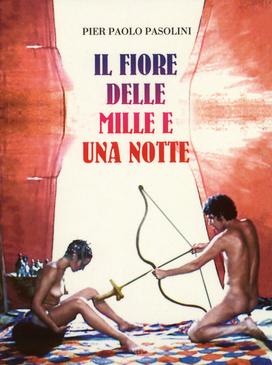
Salo tends to be the late Pasolini film that everyone talks about, but I prefer the previous "Trilogy of Life" films, including this final entry, his version of a collection of tales from the Arabian Nights. Very sexual in less scatological or sadistic ways, but is far more aesthetically sensual. 
Karel Zeman's version of The Adventures of Sinbad the Sailor is more of a fully-fledged animation than his mixed media predecessors, but retains many of his aesthetic idiosyncrasies, with cut-up montages and multi-layered diaramic compositions.
In the West, Ray Harryhausen had a late-career run with two Sinbad movies, starting with this one, released in America in 1974, creating sumptuous fantasy adventures that I am unabashedly in love with. This film, in particular, takes advantage of those influences facilitated by the ancient Indian Ocean trade routes importing myths from India, Pali, Siam and the South Pacific into the Arabic canon.
- •
- Rock
- Moderator
 Offline
Offline 
Re: 1974: Lil Jinn's Year of Prescient Cinema
You left out the most enticing part of the last one.
I am not above abusing mod powers for my own amusement.
- Jinnistan
- Administrator
 Offline
Offline 
Re: 1974: Lil Jinn's Year of Prescient Cinema

Beyond the Door (English title) is officially the worst Exorcist rip-off of 1974, and probably all-time as well. I suppose the recent restoration does make it look less cheap than the faded print used for the VHS version, and some people have had the contrarian impulse to try to champion the film (*sideeyes crumbs*).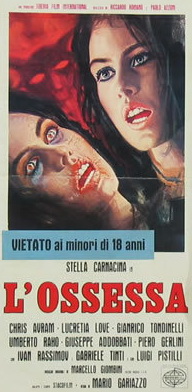
Some people would prefer to cite this - sometimes titled The Sexorcist - as the worst of the Exorcist rip-offs because some people have no sense of humor.

Two giallos from Umberto Lenzi, arguably among his best or at least on par with Knife of Ice.
More of a hypnotic psychological mystery, the real star here is cinematographer Vittorio Storaro.
An international production known under a half a dozen names, the most common English title is The Living Dead at Manchester Morgue, and it is one of the very best zombie films of the decade.
- •
- Jinnistan
- Administrator
 Offline
Offline 
Re: 1974: Lil Jinn's Year of Prescient Cinema
Rock wrote:
You left out the most enticing part of the last one.
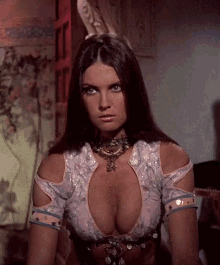
- •
- Jinnistan
- Administrator
 Offline
Offline 
Re: 1974: Lil Jinn's Year of Prescient Cinema

The king of giallo, Mario Bava, presents one his best with Lisa and the Devil, a psychological twister which employs many of Bava's skills of misdirection. Prior to being restored to its intended form, this film could also have been in the sweepstakes for worst Exorcist rip-off for its mutilated American cut which substituted about 20 minutes with completely unrelated exorcism footage to cash in on the trend. Bava, naturally, disowned this version, which is now completely unnecessary except as a textbook demonstration for cynical commercialism.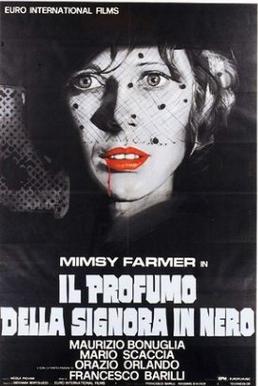
Many giallos take advantage of the hallucinatory nature of the psychedelic era, combining hypnotic techniques with Hitchcockian mise-en-scene. This film throws in a little voodoo and occult as well. One of only two films directed by Francesco Barilli, an actor with enormous filmmaking talent.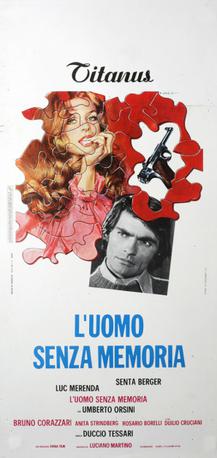
Another giallo that's closer to a Hitchcock crime mystery than actual horror, about an amnesiac who may have been involved with some very dangerous people over some very valuable narcotics. Duccio Tessari was a workhorse who made films in all of the Italian genres, and has a very special knack for camera choreography and finding unique ways of introducing information in economic and clever ways.
Enough of a crime mystery to be officially considered a giallo/poliziotteschi hybrid, this film is something of a follow-up to director Massimo Dallamono's What Have They Done to Solange?, which was a more clear cut giallo but both films deal with a criminal underground which exploits underage girls.
- •
A lot of people don't realize what's really going on. They view life as a bunch of unconnected incidents and things. They don't realize that there's this lattice of coincidence that lays on top of everything. Give you an example; show you what I mean: suppose you're thinking about a plate of shrimp. Suddenly someone'll say, like, plate, or shrimp, or plate o' shrimp out of the blue, no explanation. No point in looking for one, either. It's all part of a cosmic unconciousness.
Everybody's into weirdness right here.

